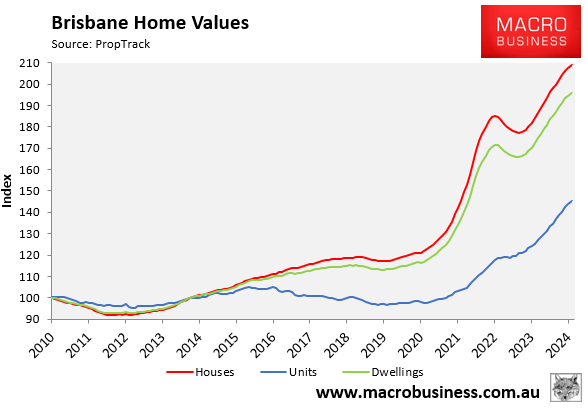Independent economist Tarric Brooker coined the term “burnout economics” to describe the situation where the RBA’s efforts to slow the economy via interest rates are undone by governments pumping demand via fiscal stimulus.
Such a situation is akin to having one foot planted firmly on the brake, with the other foot planted on the accelerator.
With the incumbent Queensland Labor government trailing heavily in the polls ahead of this year’s election, it has announced a bunch of ‘cost-of-living’ measures aimed clearly at buying votes, including:
- The state government will spend $150m to make all public transport journeys just 50c.
- Vehicle registration costs will be slashed by 20% for the next 12 months, costing the budget $435 million.
- For one year only FairPlay vouchers – to help families cover the cost of children’s sport – will rise in value from $150 to $200.
- The threshold for the first homeowner concession on transfer duty will rise from $500,000 to $800,000.
Some economists were less than impressed, warning that the subsidies would drive inflation:

Lowering government mandated prices like public transport and car rego would actually lower CPI inflation, other things equal (just as lifting those prices raises inflation).
However, the other cash subsidies will put upward pressure on inflation at the margin. So, whether the cost-of-living relief is overall inflationary is moot.
The first home buyer subsidies will also be inflationary for house prices, which have already risen enormously:

The bigger issue for inflation and the health of the state budget is the huge lift in spending on renewable projects, which sounds like pure pork:
“Tuesday’s budget will include $26bn for renewable energy and jobs plan over four years”.
“It’s higher than the $19bn allocated in last year’s budget and covers existing or new projects, not blowouts – according to the energy minister”.
Because of this spending, initial hopes of two surpluses in 2024-25 and 2025-26 have swung to a deficit of $3 billion before recovering to less than $1 billion in 2025-26.
The overall inflationary effects may be uncertain. But what is not uncertain is that this is a cynical budget from a desperate government trying to buy its way back into power.
The below interview with Radio 4BC’s Bill McDonald explains these issues:

